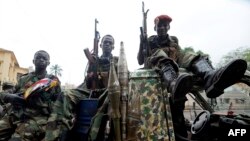UNITED NATIONS —
The U.N. Security Council is considering options for stemming violence and restoring the state’s authority in the Central African Republic, including the possibility of deploying a U.N. peacekeeping mission.
Warnings are coming from many quarters that the situation in the Central African Republic is on a downward spiral of lawlessness, humanitarian need, human rights abuses and a lack of governance that could have ramifications beyond its borders.
The situation has been volatile and unstable since rebels from the Séléka coalition overthrew the government of President Francois Bozizé in March. Meanwhile, inter-communal tensions are simmering between Muslims and Christians, leading to attacks and reprisals.
Currently, the regional group ECCAS (Economic Community of Central African States) plans to transition its mission to an African Union-led mission of about 3,600 troops known as MISCA on December 19.
The Central African Republic’s transitional authorities have also asked France to increase its soldiers in the country, which currently number about 400. Reports say they will be tripled to about 1,200.
French Ambassador Gérard Araud told reporters after Security Council discussions Monday that Paris would be reinforcing its presence in the Central African Republic.
“Our force will have, in the first instance -- it will be a bridging force before the African force is fully operational," he said. "And after that, when the African force is fully operational, we will support the African force.”
In a report earlier this month, U.N. Secretary-General Ban Ki-moon warned that the implications for the region of the growing insecurity in the Central African Republic should not be underestimated. He said that a failure to act decisively now could make future intervention more costly and complex.
Ban laid out five options for international support to the CAR, including bilateral and multilateral support; United Nations support funded through a trust fund; and the possible transformation of the African support mission into a U.N. peacekeeping operation.
Ban’s deputy, Jan Eliasson, told the Security Council that a recent U.N. assessment mission to the country found a majority of support for a U.N. peacekeeping mission.
“The transformation of MISCA into a United Nations peacekeeping operation, with an estimated strength of 6,000 troops and 1,700 police personnel, would lay the foundation for transparent, accountable and resilient institutions, governed by the rule of law," Eliasson said.
But Ambassador Araud cautioned that a U.N. peacekeeping mission would not be deployed soon.
He said France planned to circulate a draft resolution Monday night that would call for support for the African Union force since it is already on the ground. The resolution would also ask the U.N. secretary-general to report back to the Security Council in three months about the possible transformation of MISCA into a U.N. force.
“We have the African force; the African countries are committed to act," Araud said "So the emergency commends that we support the African force, but we don’t exclude the peacekeeping operation down the road, but we need the report to do it.”
Araud said France hopes the draft resolution will be adopted by the 15-nation council next week.
Warnings are coming from many quarters that the situation in the Central African Republic is on a downward spiral of lawlessness, humanitarian need, human rights abuses and a lack of governance that could have ramifications beyond its borders.
The situation has been volatile and unstable since rebels from the Séléka coalition overthrew the government of President Francois Bozizé in March. Meanwhile, inter-communal tensions are simmering between Muslims and Christians, leading to attacks and reprisals.
Currently, the regional group ECCAS (Economic Community of Central African States) plans to transition its mission to an African Union-led mission of about 3,600 troops known as MISCA on December 19.
The Central African Republic’s transitional authorities have also asked France to increase its soldiers in the country, which currently number about 400. Reports say they will be tripled to about 1,200.
French Ambassador Gérard Araud told reporters after Security Council discussions Monday that Paris would be reinforcing its presence in the Central African Republic.
“Our force will have, in the first instance -- it will be a bridging force before the African force is fully operational," he said. "And after that, when the African force is fully operational, we will support the African force.”
In a report earlier this month, U.N. Secretary-General Ban Ki-moon warned that the implications for the region of the growing insecurity in the Central African Republic should not be underestimated. He said that a failure to act decisively now could make future intervention more costly and complex.
Ban laid out five options for international support to the CAR, including bilateral and multilateral support; United Nations support funded through a trust fund; and the possible transformation of the African support mission into a U.N. peacekeeping operation.
Ban’s deputy, Jan Eliasson, told the Security Council that a recent U.N. assessment mission to the country found a majority of support for a U.N. peacekeeping mission.
“The transformation of MISCA into a United Nations peacekeeping operation, with an estimated strength of 6,000 troops and 1,700 police personnel, would lay the foundation for transparent, accountable and resilient institutions, governed by the rule of law," Eliasson said.
But Ambassador Araud cautioned that a U.N. peacekeeping mission would not be deployed soon.
He said France planned to circulate a draft resolution Monday night that would call for support for the African Union force since it is already on the ground. The resolution would also ask the U.N. secretary-general to report back to the Security Council in three months about the possible transformation of MISCA into a U.N. force.
“We have the African force; the African countries are committed to act," Araud said "So the emergency commends that we support the African force, but we don’t exclude the peacekeeping operation down the road, but we need the report to do it.”
Araud said France hopes the draft resolution will be adopted by the 15-nation council next week.




